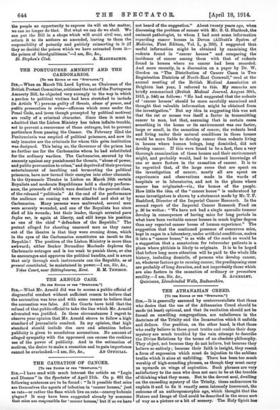THE PORTUGUESE AMNESTY AND THE CA RBONA RIOS.
[To in EDITOR or ram “Sercrwroa."] SIIL—When on March 7th Lord Lytton, as Chairman of the British Protest Committee, criticized the text of the Portuguese Amnesty Bill, he objected very strongly to the way in which a pardon to political victims had been stretched to include (in Article V.) persons guilty of threats, abuse of power, and public provocation to crime—offences which come under the Penal Code, and (even though prompted by political motives) are really of a criminal character. Since then it must be admitted that the Lisbon Ministry has taken infinite trouble, not to prevent a recurrence of these outrages, but to prevent particulars from passing the Censor. On February 22nd the Penitenciar•ia was emptied of political prisoners, and now its only inmates are the criminals for whom this grim institution was designed. This being so, the Governor of the prison has no further use for the Carbonarios whom he had substituted for the ordinary warders. The Carbonarios, secured by the amnesty against any punishment for threats, "abuse of power, and public provocation to crime," and deprived of their previous entertainment of insulting and tormenting the political prisoners, have now turned their energies into other channels. In the Gymnasio Theatre in Lisbon on March 16th certain Royalists and moderate Republicans held a charity perform- ance, the proceeds of which were destined to the poorest class, of the released " politicale At the end of the performance the audience on coming out were attacked and shot at by Carbonarios. Many persons were maltreated, several men were severely wounded, and one of the Royalists has since died of his wounds ; but their leader, though arrested pare Ingles ver, is again at liberty, and still keeps his position as one of the chief " defenders of the Republic." The pretext alleged for shooting unarmed men as they came out of the theatre is that they wore evening dress, which in the eyes of the Carbonarios constitutes an insult to the Republic! The position of the Lisbon Ministry is more than awkward; either Senhor Bernadino Machado deplores the Carbonario outrages and is too weak to punish them, or else be encourages and approves the political bandits, and is aware that only through such instruments can the Republic, as of present constituted, be maintained in power.—I am, Sir, &c., Yokes Court, near Sittingbourne, Sent. E. M. TENISON.










































 Previous page
Previous page